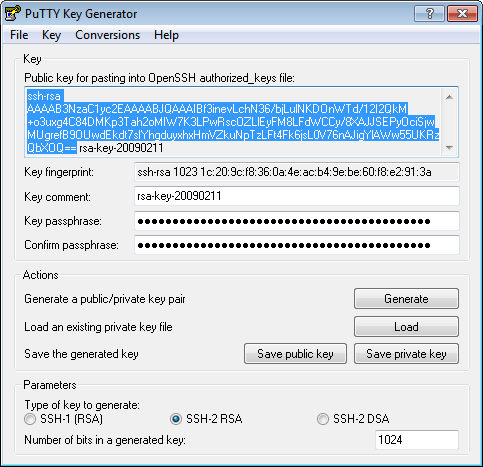Putty Generate Ssh Key Windows

The PuTTYgen program is part of PuTTY, an open source networking client for the Windows platform.
Puttygen Generate Ssh Key Windows
How to Generate SSH Public/Private Keys on Windows By Alexandru Andrei – Posted on Sep 17, 2019 Sep 17, 2019 in Windows If you ever managed a Linux server from Windows, you probably used PuTTY or at least heard about it. As well as offering additional security, SSH key authentication can be more convenient than the more traditional password authentication. When used with a program known as an SSH agent such as PuTTY, SSH keys can allow you to connect to a server, or multiple servers, without having to remember or enter your password for each system. Jul 19, 2013 This tutorial assumes that you are familiar with DigitalOcean's guide on How to Log Into Your Droplet with PuTTY (for windows users). PuTTY Key Generator (a.k.a. PuTTYgen) While PuTTY is a client program for SSH (in addition to Telnet and Rlogin), it is not a port of or otherwise based on OpenSSH. Ssh-keygen does not come installed with windows. Here's how to create an ssh key with Putty: Install putty; Open PuttyGen; Check the Type of key and number of bytes to use; Move the mouse over the progress bar; Now you can define a passphrase and save the public and private keys; For openssh keys, a few more steps are required. Oct 17, 2019 Though there are varying methods of generating SSH keys on machines using Windows, this one uses PuTTY Key Generator. 1: Generate the key. ATTENTION: The procedure and screen captures in this section reflect the latest version of PuTTY as of July 21, 2017 (0.70). If you use a different version, your interface may differ from the one pictured.
Putty Generate Ssh Key Windows Xp
Generate Ssh Key Aix
- Download and install PuTTY or PuTTYgen.
To download PuTTY or PuTTYgen, go to http://www.putty.org/ and click the You can download PuTTY here link.
- Run the PuTTYgen program.
- Set the Type of key to generate option to SSH-2 RSA.
- In the Number of bits in a generated key box, enter 2048.
- Click Generate to generate a public/private key pair.
As the key is being generated, move the mouse around the blank area as directed.
- (Optional) Enter a passphrase for the private key in the Key passphrase box and reenter it in the Confirm passphrase box.
Note:
While a passphrase is not required, you should specify one as a security measure to protect the private key from unauthorized use. When you specify a passphrase, a user must enter the passphrase every time the private key is used.
- Click Save private key to save the private key to a file. To adhere to file-naming conventions, you should give the private key file an extension of
.ppk(PuTTY private key).Note:
The.ppkfile extension indicates that the private key is in PuTTY's proprietary format. You must use a key of this format when using PuTTY as your SSH client. It cannot be used with other SSH client tools. Refer to the PuTTY documentation to convert a private key in this format to a different format. - Select all of the characters in the Public key for pasting into OpenSSH authorized_keys file box.
Make sure you select all the characters, not just the ones you can see in the narrow window. If a scroll bar is next to the characters, you aren't seeing all the characters.
- Right-click somewhere in the selected text and select Copy from the menu.
- Open a text editor and paste the characters, just as you copied them. Start at the first character in the text editor, and do not insert any line breaks.
- Save the text file in the same folder where you saved the private key, using the
.pubextension to indicate that the file contains a public key. - If you or others are going to use an SSH client that requires the OpenSSH format for private keys (such as the
sshutility on Linux), export the private key:- On the Conversions menu, choose Export OpenSSH key.
- Save the private key in OpenSSH format in the same folder where you saved the private key in
.ppkformat, using an extension such as.opensshto indicate the file's content.